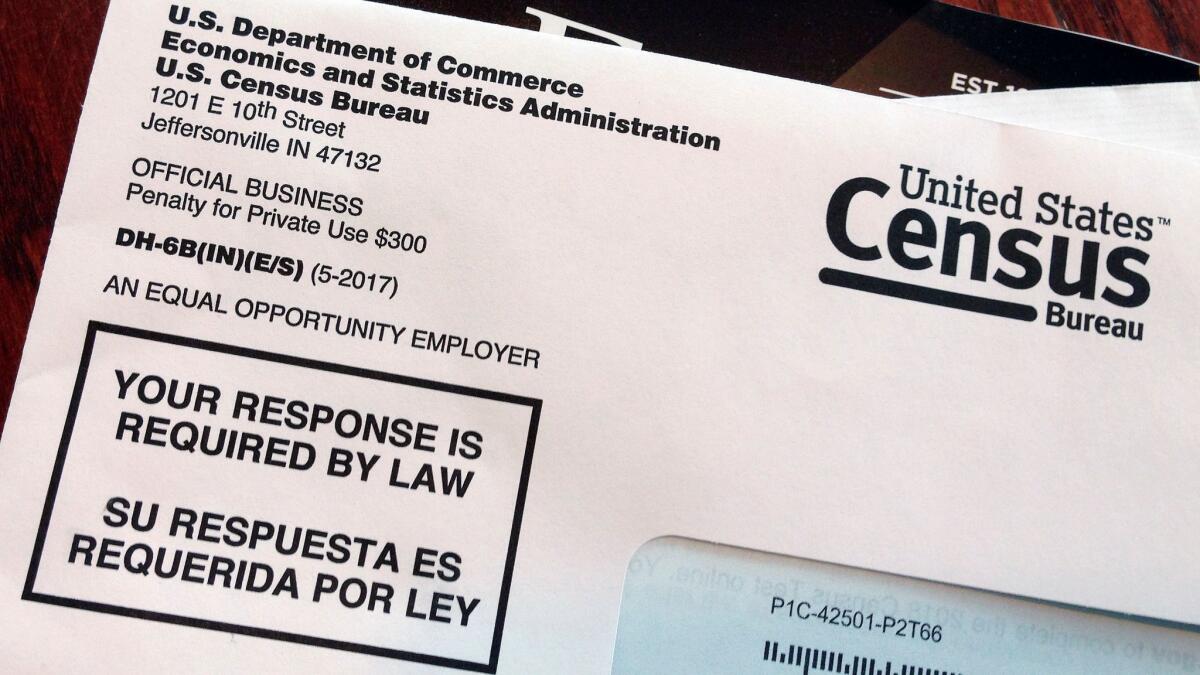Opinion: Wilbur Ross wants to undercut the census. Will the Supreme Court let him?

- Share via
President Trump pushed the U.S. Supreme Court to take up a challenge to his administration’s decision to add a citizenship question to the 2020 census. On Friday morning, the court agreed to do just that, setting the stage for oral arguments in April and a decision by the end of June.
Good. Now let’s hope the court sees through the government’s pretext of needing the information to enforce voting rights — the specious claim pushed by Commerce Secretary Wilbur Ross — and tosses the question for good.
Oh, how do we know it’s a specious claim? Because, among other things, a census advisory panel told us so.
The Constitution requires the federal government take a national census every 10 years, which it has done since 1790, when the U.S. capital was in New York City, George Washington was president, and the country barely extended west from the Atlantic into the Appalachians. California? Mostly native tribes and a smattering of Spanish settlers.
Yeah, it was a different nation then.
But the important aspect of that constitutional census requirement, and Supreme Court decisions related to it, is that the federal government is required to count everyone living in the U.S. at the time of the census, regardless of legal status. So the citizenship question is irrelevant to the government’s constitutional mandate.
It was really Steve Bannon’s idea.
Ross, who concocted a ruse about the Justice Department seeking the citizenship question, said it is necessary for the government to collect citizenship data to help it enforce voting rights. But voting-rights activists say they don’t need any more data to pursue allegations of voting-rights violations.
And Ross’ assertion was refuted by internal memos and his own staff recommendations. Oh, and it was really Steve Bannon’s idea — you remember him, Trump’s former “economic nationalist” policy advisor? A federal judge in New York blocked the addition of the question, ruling that Ross’ decision was “arbitrary and capricious” and failed to follow the Administrative Procedures Act.
Yes, the government has asked the question in past censuses, but not since 1950, and in a radically different political environment from today — back then the government feared real and suspected communists and leftists more than immigrants.
Enter the Fray: First takes on the news of the minute »
What’s really going on here is an attempt by Republicans to scare folks who live here illegally, and those who may live with them, into avoiding census takers. When the government makes a major political issue out of ejecting people living here illegally, and occasionally tries to deport a citizen in the process, there’s an understandable reticence among immigrants to answer questions from federal bureaucrats.
Oh, and those immigrant communities tend to be in urban areas that support Democrats. So by depressing the immigrant count in the census, the congressional and legislative district lines that are drawn on the basis of the new census count get warped, leading to unequal distribution — the undercount results in more people living in Democratic districts than in Republican districts, tilting the advantage to conservative, more rural areas.
Crafty, eh?
More to Read
A cure for the common opinion
Get thought-provoking perspectives with our weekly newsletter.
You may occasionally receive promotional content from the Los Angeles Times.







